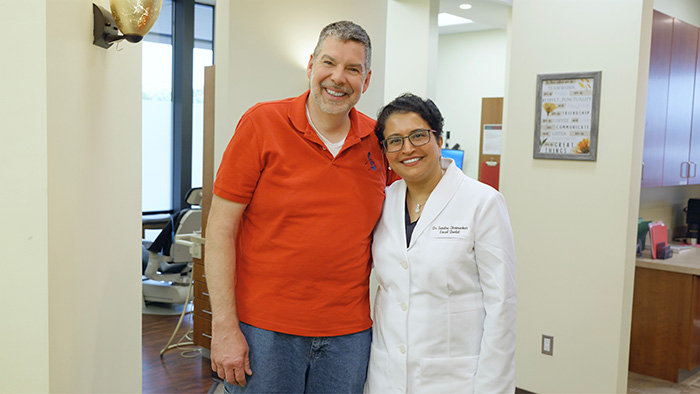Is Tooth Extraction the Next Step for Your Smile?
No one looks forward to tooth extraction but there are times when it’s the most plausible solution and the best for your smile as a whole. Whether you’re grappling with a troublesome tooth or simply curious about the process, our Ann Arbor dentists can help you to understand tooth removal and empower you to make informed decisions about your dental health.
Here are a few scenarios where dental extraction may be necessary and what restorative methods you can choose following the procedure.
When & Why Tooth Extraction Becomes Essential
Pulling a tooth becomes important when there’s a dental issue that compromises not only the health but functionality of your smile. A few of the most common reasons for tooth extraction include severe tooth decay, advanced gum disease leading to tooth instability, and impacted wisdom teeth.
When you have extensive decay or damage where the tooth cannot be effectively restored through procedures like dental fillings or root canals, extraction may be the most viable option to prevent further spread of infection and preserve overall oral health. Similarly, wisdom teeth that are impacted can cause pain, infection, and misalignment of teeth, often requiring extraction to alleviate discomfort and prevent complications.
Signs indicating the need for the procedure typically manifest as persistent symptoms and observable changes in oral health. What might start out as nagging but manageable, can become downright disruptive to your day if you don’t see our tooth extraction dentists in time.
In turn, patients may come to experience:
- Ongoing discomfort in the affected tooth or surrounding area
- Swelling, inflammation, and tenderness in the gums around the tooth
- Gum recession or mobility of the tooth
- Jaw pain
- Bad breath
Dental X-rays play a crucial role in diagnosing the extent of tooth damage or impaction, guiding the decision-making process regarding extraction. Consulting with our team upon experiencing any of these symptoms is essential for timely evaluation and appropriate treatment planning.
What to Anticipate for Tooth Extraction
Preparing for the tooth extraction procedure involves an initial consultation with one of our local family dentists to assess the specific condition of the affected tooth and discuss whether any conservative treatments can be performed first. If a surgical procedure is needed, we may refer you to a nearby oral surgeon where you’ll receive detailed pre-op instructions and preparations for anesthesia or sedation.
The extraction itself typically begins with the administration of local anesthesia to numb the affected area and minimize discomfort. Our dentists start by assessing factors such as tooth condition, position, and accessibility before removing the tooth using a dental elevator and forceps. From start to finish, it’s fairly straightforward and brief if you’re in for a simple extraction.
Following the extraction, patients receive post-operative care instructions to manage pain, swelling, and bleeding, as well as to promote proper healing and recovery.
Strategies for Restoration After Tooth Removal
Once the area where the extraction occurred has healed, that’s when tooth replacement becomes the primary concern for many patients. Dentures offer a popular option for replacing missing teeth, providing a removable prosthetic solution that mimics the appearance and function of natural teeth.
Depending on the extent of tooth loss, patients may opt for partial dentures, which replace multiple missing teeth while preserving existing healthy teeth, or full dentures, which replace all teeth in a dental arch. Removable dentures are custom-made to fit the patient’s mouth comfortably and securely, allowing for improved speech and chewing. Immediate dentures can also be placed after extraction to act as a placeholder for the permanent appliance.
Helpful Tips → How to Navigate Your New Life With Dentures
If you’re interested in a more permanent solution that doesn’t need to be adjusted over time, dental implants are surgically placed into the jawbone, where they fuse with the surrounding bone tissue. By comparison, dentures rest on top of the gums and may require adhesives for added stability. This integration provides a strong foundation for dental crowns which are attached to the implants for a secure and natural-looking restoration.
No matter which option you choose, our skilled dentists can help you beautifully and seamlessly restore both the function and appearance of your smile.
Make an Appointment
Our dentists in Ann Arbor, MI, will always let you know if tooth extraction is necessary before we get started. Call Excel Dental today at (734) 929-9999 to request an appointment and learn more.
This blog post has been updated.


